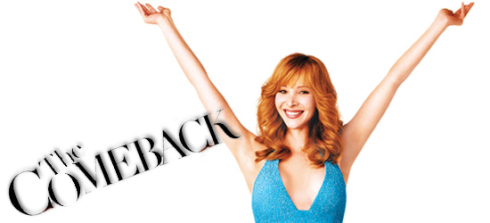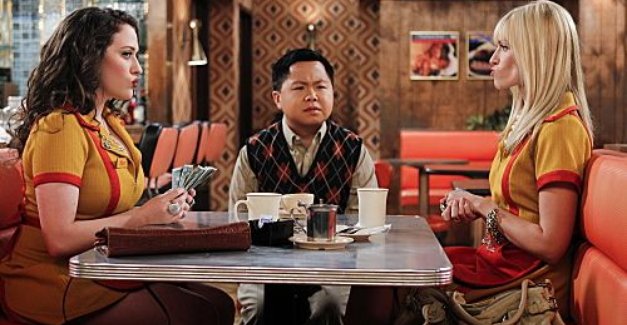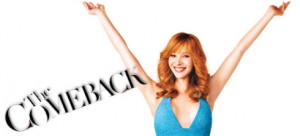
The Comeback is a deeply thought-out, complicated show about shallow television.
Through its one and only season, the fake reality show chronicled the life of Valerie Cherish, played by my favorite Friend, Lisa Kudrow, an 80’s has-been trying to make a comeback through her role on an insipid sitcom. Valerie was a perfect reality star, yelling at the cameras, fighting with her co-workers and suffering one dignity after another, to the point where watching the show can be painful at times.
But as a scripted series, The Comeback never really caught on. Created by Sex and the City’s Michael Patrick King, the cringe comedy only ran for 13 episodes on HBO before cancellation. It has since enjoyed a second life through DVDs and streaming, acquiring a reputation as a cult program. In May, HBO announced The Comeback’s revival for a six-episode limited series set to air this fall.
It’s easy to figure out why the show was unpopular in its original run, as it’s unlike anything else on TV. Valerie is often unlikeable, out-of-touch and incredibly vain, traits not often found in female lead characters. Though there have been female characters like Valerie, they have generally been only supporting figures providing comic relief. Also unusual are the show’s dark tone and raw footage format, which allows Valerie to run through multiple takes of different actions which are supposed to be spontaneous reality, call for time-outs when something is said that she doesn’t want to air and repeatedly tell filmmakers to stop filming (though they never do). It’s important to note however, that similar shows with male leads like Curb Your Enthusiasm and The Office have been very popular.
The character of Valerie Cherish is well-observed and very specific. She is a Hollywood wife married to a successful executive, carting around her Birkin bag and her loyal closeted hairdresser, Mickey. She’s also incredibly fake, adopting an glamorous, affected attitude, a trendy passion for yoga and eastern spirituality, and a love of dogs and distancing herself from embarrassing friends, to put herself in the best possible light for the cameras.
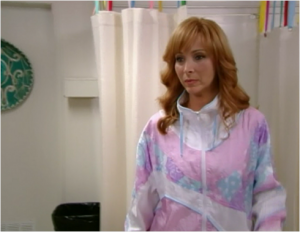
Early on, Room and Bored, the sitcom Valerie is cast in, originally a show about four single women in their 30s and 40s, is retooled to be sexier and hipper. The leads are given to a former Disney star and a pop star taking on her first acting role, male “hunks” are added, and the sitcom instead focuses on sexy 20-somethings in bikinis sleeping with each other. There is barely space for Valerie, who is cast as Aunt Sassy, an uptight, frumpy woman who wears only pastel jogging suits and usually appears in only one scene of each episode. Still Valerie is unable to accept that she is not the star. While her former TV show, I’m It, is generally forgotten and she hasn’t worked it years, she refuses to admit that she even needs a comeback.
Throughout the series, Valerie often frustrates her co-workers by trying to control the production and writing of Room and Bored and get a larger role for herself. For example, in cast photo session, where she is asked to stand far in the background, she continuously moves forward to stand with the young cast. In another scene, she angers the writers by protesting a joke she feels would make viewers dislike her character and wins the studio audience’s approval by getting them to chant for her to get another take. She is reminded several times to view The Comeback as her show and her main shot and to allow the 20-somethings to have Room and Bored, but she never listens.
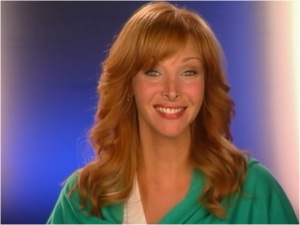
Though Valerie is generally well-meaning, she seems genuinely oblivious to the people she uses and takes for granted in her struggle back to the top. She uses a writer named Gigi to get better story lines, even when it complicates Gigi’s job, tries to convince a young gay fan to come out for the sole purpose of using his gushing praise of her on the show, and dismisses Mickey when it suits her. However, this behavior never comes from a place of outright meanness, but instead a lack of empathy.
But what The Comeback gets so right, is its display of Valerie’s humanity. While she’s not always likable, she is always understandable. In Valerie’s nervous, brittle laugh, her frequent clearing of her throat when uncomfortable and her obsession with appearing perfect, a deeply self conscious, even desperate woman emerges. Kudrow’s performance is as much in what she doesn’t say as what she does, and the pain behind her eyes when she experiences a setback and tries to brush it off makes her deeply sympathetic. Valerie absorbs a lot of ridicule and humiliation in 13 episodes, much more than most people could take. Yet she continues to grow and adjust rather than shut down. Rather than lash out at her cruel co-workers and risk her job she smiles and pretends to enjoy being the butt of jokes.
Valerie is also desperate to be liked and is constantly giving gifts and trying to take coworkers out to lunch. She plays out elaborate rituals, jokes and skits to get people to like her and yearns for the approval of her young costars. As her life continues to fall apart, Valerie keeps smiling. When Room and Bored gets bad ratings, she gives a speech to the cat about keeping up hope and trying harder. She’s the closest thing there is to a female Michael Scott: clueless and insensitive but ultimately redeemed through her genuine well-meaning.
Though viewers come to assume things are going to go wrong for her, nine times out of 10 she’s created the trouble for herself. It’s surprising when one of her seemingly delusional ideas works out, such as when she gets Tom Selleck to agree to play Aunt Sassy’s boyfriend. Often watching The Comeback is like watching a horror movie, which forces you to scream at the characters onscreen to stop and think about what they’re doing. While viewers are allied with Valerie and want her to succeed, we understand why she fails and agree with the realism of what happens. In reality, without an all access pass to Valerie’s insecurities and the moments where her persona falters, she would be very difficult to root for.
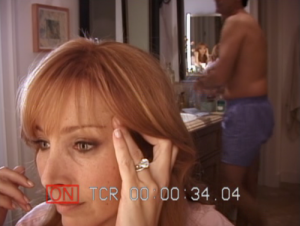
The Comeback has no great love for reality TV. Throughout the series, Valerie is followed around by her reality crew, who are always hoping something awful will happen in Valerie’s real life that will boost ratings. The crew creates chaos following her and require multiple conversations to plan logistics and their presence causes the cast and writers of Room and Bored to resent Valerie. In the final episode, when the reality show is pieced together, it is revealed that much of what Valerie and the people around her have said and done was manipulated in editing and used to created cheap laughs at her expense. Paulie G. (Lance Barber), a writer on Room and Bored who is relentlessly cruel to Valerie is portrayed as a consummate professional who Valerie abuses unprovoked.
Though Valerie tries to maintain control over the reality show and of how she is portrayed, she misunderstands what the show is and what viewers want. She decides the director, Jane (Laura Silverman) is her friend and tries to be close to her, getting her a gift bag at the awards show and inviting her to her premiere party. Valerie feels that a friendship with Jane will allow her to be portrayed in a positive way and feels betrayed as a friend and disrespected as the celebrity she feels she is, when she sees how Jane edited the footage. It takes her a long time to respect Jane’s judgement and understand what Jane always knew: that conflict is what makes a good reality show.
Another interesting facet of The Comeback is its portrayal of an adult workplace as full of immaturity and pettiness. In the same way Leslie Knope’s idealism is tested by the baffling ignorance of Pawnee’s city council, Valerie grapples with Paulie G., a fratboy misogynist who sees no value in women beyond sexual objectification. At every turn, Paulie G. tries to thwart Valerie and make rude comments about her, though its clear that if she was 20 years younger, he’d tolerate anything she did. In addition, Paulie G. torments Gigi, the sole female writer, for being overweight.
In one memorable scene, Valerie comes to the studio late at night to bring cookies to the writers and finds them mocking her and portraying her in crude sexual playacting. While she expected Paulie G., who wears his contempt for her on her sleeve, to mock her, she is shocked to see that behind closed doors, the other writers, including Tom Peterman who had appeared to like her, join in on the mockery and call her pathetic.
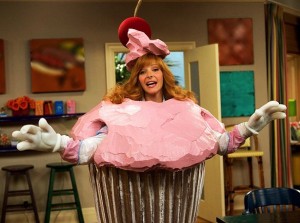
The show also explores Hollywood’s intolerance of aging women. Valerie is too young to play Aunt Sassy, an under developed character who appears to be written as a senior citizen. As an older woman, Valerie is shuffled off to the sidelines of the show and as Aunt Sassy, is exclusively given lines about how pathetic and sexually frustrated she is. When Aunt Sassy is given a spotlight episode about her romantic life, Valerie relishes the opportunity to flesh out the character and make her more than a punchline. But the episode is quickly cancelled and Valerie is told that writers and producers see giving Aunt Sassy a storyline as a step in the wrong direction.
Though Valerie still feels youthful and attractive, by Hollywood’s standards, she’s ancient. Valerie is married with a step-daughter and prefers staying home to going clubbing, she can’t keep up with the twenty-somethings on her show and along with her husband Mark, worries that she can’t do things like have adventurous sex or do coke anymore. Most of her young costars treat her with distanced politeness, like a visiting relative.
Still, the show allows Valerie to be attractive. In one episode, even Paulie G. drools over a sexy photo of her and briefly looks at her in a new light after seeing her. In another, Valerie wears a low-cut dress to an award show and is complimented for her body.
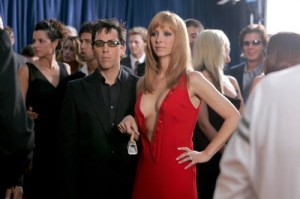
It’s difficult for Valerie to watch everyone fawn over Juna (Malin Akerman), the star of Room and Bored. Juna is young, thin and her attractiveness is constantly discussed and stressed by the show’s direction. In one scene, Juna’s costume, a tiny bikini, is contrasted with Valerie’s dowdy jogging suit. When Juna changes in front of Valerie’s cameras and Valerie notices her young body, she enters a one sided competition with the young star. Valerie is determined to prove herself still relevant and attractive, as shown when, Juna lands the cover of Rolling Stone with a provocative pose and Valerie responds by bringing in topless poster from her own youth.
But Juna proves to be Valerie’s only consistent ally and she eventually decides to put aside her jealously and act as a mentor. Their relationship seems to grow into a genuine friendship, but continues to be frequently manipulative on Valerie’s part as she uses her allegiance with Juna to boost her own star and her place on the show. Her friendship with Juna also helps her to connect with her stepdaughter, Francesca a rebellious teenager who loves Juna and thinks Valerie is cool for knowing her.
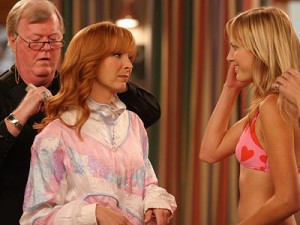
The Comeback was a show ahead of its time, but maybe it’s time has finally come. Reality TV is more omnipresent than ever, and with no sign of slowing down.
There’s a retrospectively ironic moment in one of the early episodes, when Valerie sees a magazine cover that asks, “Is Reality TV Dying?” and becomes worried that her show will fail. But by the series’ final episode, it’s clear Valerie Cherish’s comeback will be a huge success, as it offers everything viewers expect from reality TV. I’m looking forward to the seeing how the series will tackle our current media and to catching up with a fascinating female character when it returns this fall.
________________________________________________________________
Elizabeth Kiy is a Canadian writer and freelance journalist living in Toronto, Ontario.
